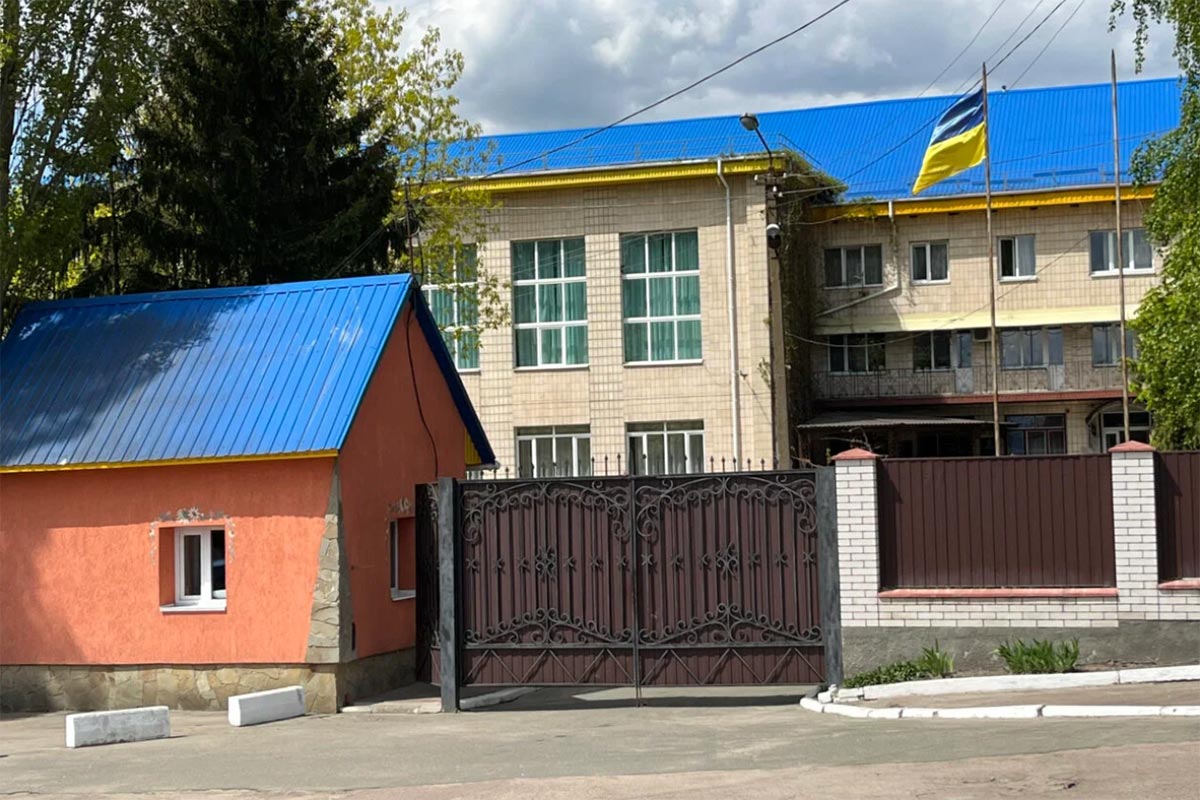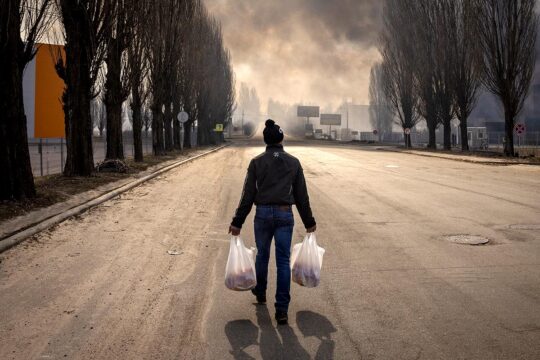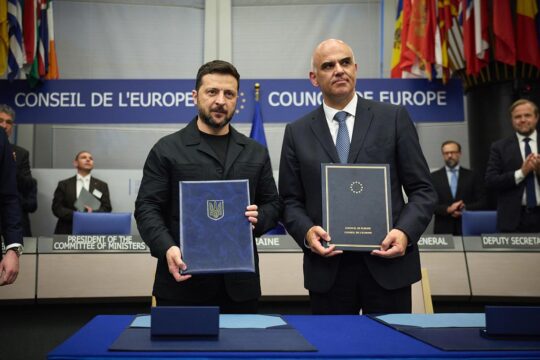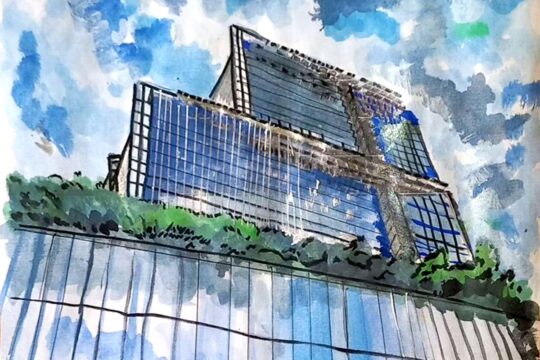At 10 am on February 26, 2022, Maryna Hanitska saw a tank with the letter V outside the gate and took a picture of it. In the first days of the invasion, the Russians would shoot at windows to keep people away from staring at them. While she still had a cell phone connection, Hanitska was posting on Facebook to let everyone know that there were patients in her institution: “In case they kill us. I recorded a video to leave a trace.”
Hanitska was the director of Borodyanka’s psychoneurological care centre, in the region of the Ukrainian capital Kyiv, when in February 2022 some 400 residents of the institution, including bedridden patients and those in wheelchairs, staff, people from neighbouring houses and children, became hostages of the Russian occupiers.
“We figured they were Chechens”
“On March 5, they broke down the gate and burst into the yard with their cars,” she recounted at the trial. “From the way they looked, we figured they were Chechens. They forced all of us outside. They searched the building, threatened us that if they found weapons or if we were hiding soldiers or members of the territorial defence, if we were Nazis, we would be executed, killed, blown up. They scared us with threats: ‘The surroundings are rigged with mines. Do you know how much time it would take for nothing to be left of you here?’ or: ‘We will pack you in a box and send it to your president, because you have the Nazi government in Kyiv, and we have come to burn your government’.”
“It was cold, 10-12 degrees below zero,” the Institute director recalled at the hearing. “They were undressing our patients looking for tattoos. They thought they were from the territorial defence and not residents, since they didn’t look like they were sick. I begged them not to shoot. I said: ‘You see a lot of men, they are just sick people, they are like kids. I simply ask you not to shoot’. They said: ‘Show us the children’. I said: ‘I can’t show you the children because you are armed’. We had the children in a separate basement. Most of our children are autistic. The diagnosis means that even holding a child’s hand is not always possible.”
The workers would give the soldiers the keys to the doors, but they would ignore them and break in, entering the rooms where patients were lying in beds. They were not wearing balaclavas, all of them had their faces uncovered. Most had long beards, wore new, clean, “elite” uniforms, and always wore St George’s ribbons [used in Russia to honour military valour], according to the testimony.

Daniil Martynov, the Russian in charge
One of them was in charge. He had no beard and spoke pure Russian, without an accent, gave commands and everyone obeyed him without question. Behind him, there were 6-10 soldiers who served as bodyguards. It was Daniil Martynov. He saw that people were very scared, and introduced himself saying that they were not fighting civilians but had come to liberate them. He assured people that he was responsible for his subordinates. He promised that no one would be hurt if people did not leave the institution, because otherwise it would be perceived as an act of diversion and the soldiers would shoot to kill.
“I showed him one room, went to show the second and he changed his mind. You could smell that there were disabled people there, the smell of elderly people and those in diapers,” one of the employees recalled in court. “So, he changed his mind. ‘All right, let’s not traumatise them,’ he said. ‘Let’s go outside and continue the conversation’.”
“Thank Russian President Putin”
The employees were taken to the area in front of the institution. The director was put in the centre. Soldiers stood in front and behind her, pointing their weapons at the employees. Martynov explained that they needed to record a video and thank Russian President Vladimir Putin. Hanitska was confused. “For what?” Martynov leaned over and answered very calmly: “What do you mean, for what? For the fact that you are alive.”
“We’ll record a short video now, Marina, and then everything will be fine with you. And I can promise you that not a single glass will fall from your windows again,” Martynov said.
The woman broke down in tears, Martynov got angry and warned her that she needed to smile. Hanitska tried to imitate a smile, but her cheek started to twitch. Meanwhile, Martynov ordered to start recording on a cell phone and began to speak to the camera: “I am a colonel of the Russian army. We did not come to kill civilians but to liberate you from the nazi authorities,” Then he spoke about monuments and Victory Day. After a few minutes, Martynov turned around and asked: “...and Marina?”, reminding her of her speech. The woman rushingly replied: “Thank you for the fact that we are alive.” The filming was stopped, and the Russians were displeased: the frightened and tearful woman did not look convincing.
Due to the anxiety, Hanitska fainted, and the staff had to bring her back to her senses by sprinkling her with water. The Russians left the institution, but the residents and staff were not allowed to leave.
Shelling and mines near the patients
The occupiers positioned their military equipment around, using it to shell nearby villages – anti-tank guns, a self-propelled artillery system and BM-21 Grad system at a distance of 120-150 metres from the building, as well as buried landmines in the field nearby.
Presumably, the Russian military hoped to avoid retaliation, since there were 400 civilians nearby. To support this claim, the prosecutor submitted a satellite image dated March 11, 2022, which showed the neuropsychiatric hospice in the village of Borodyanka, as well as objects nearby, that looked like military equipment and infrastructures. By comparison, the satellite image from December 17, 2019, showed no such military installations.
The institution was cut off from electricity, water, heating and communication. Martynov allowed people to go outside the gate to get water from the well. Machine gunners were sitting in the bushes. People were also allowed to make a fire in the yard for cooking.
A maintenance worker recalled that the military had brought food twice. They didn’t say anything, they just drove into the yard and left six or seven grocery bags as if they had taken them from a local store. Another staff member said that they once brought a bag of sugar and a bag of buckwheat to the institution, which the Moscow Patriarchate Church supposedly donated. On another occasion, they said: “Give us a pot, we’ll give you food”, and brought some fish soup and a pot of boiled buckwheat, probably leftovers from their field kitchen.
The most fragile could not survive
On March 13, they allowed the people from the institution to be evacuated. When she returned in early April, Hanitska discovered that in her absence, they occupied the building. The place was in disarray, with Russian rations and faeces all over the rooms. Computers had been dismantled, and laptops had been stolen from the accounting office. The Russians smashed windows and doors and made a hole in the wall in the manager’s office.
Twelve people died in the institution during the occupation. When people returned, they reburied the bodies and planted trees in that area of the yard. “We have never had such a high mortality rate in such a short period,” Hanitska said. Employees attribute the deaths to stress from the loud sounds of the explosions, the fact that it was very cold, to the shortage of medicines and medical care, and it is likely that two of the residents had a stroke.
Martynov under US sanctions
The eyewitnesses could not identify any other soldier than Martynov. “His eyes were cold and stinging. All the others looked the same to me. Different photos were shown to me, but they all looked the same,” Hanitska said.
The prosecution established that as of February 24, 2022, Martynov held the position of “Deputy Head of the Department of the Federal Service of the National Guard Troops of the Russian Federation for the Chechen Republic”. Previously, he was a security adviser to the Head of the Chechen Republic, Ramzan Kadyrov. Until 2013, he served in the FSB’s Alpha special unit and participated in the training of Chechen special forces. Since December 2020, he has been under sanctions in the United States of America for human rights violations.
After retreating from the Kyiv region, Martynov participated in the hostilities in eastern Ukraine. On May 8, 2022, Kadyrov himself posted a video on Telegram of his “dear brother” Martynov reporting about the “liberation” of the city of Popasna in the Luhansk region.
In February 2023, it was also reported that Martynov, acting as an adviser to the Russian Minister of Emergency Situations, had travelled to Turkey as part of an official delegation to assist the earthquake victims. The Ukrainian authorities sent an extradition request to Turkey, but it remained unanswered.
This report is part of our coverage of war crimes justice produced in partnership with Ukrainian journalists. A first version of this article was published on the "Sudovyi Reporter" website.


![Image posted on 2 March 2022 on X with the following caption: “Chechen operators on their way to Ukraine’s Kyiv. Magomed Tushaev, leader of the SOBR Terek [Chechen special intervention force], is the figure on the left. Daniil Martynov, the man on the right, previously served in the FSB's Alpha unit and played a key part in creating and training the Chechen SOF [special operations forces].” Daniil Martynov in Ukraine - Photo: Two armed soldiers pose (thumbs up) in front of the back of a Porsche.](https://www.justiceinfo.net/wp-content/uploads/Ukraine_Daniil-Martynov-1000x840.jpg)





